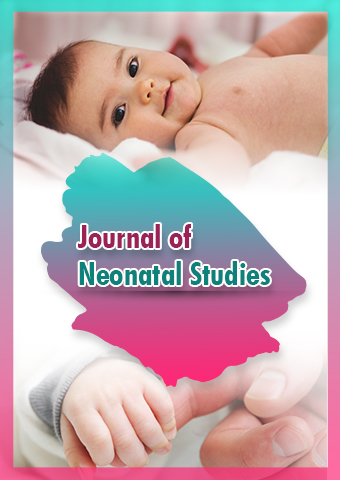Perspective - Journal of Neonatal Studies (2024) Volume 7, Issue 1
Nurturing the Youngest Minds: A Comprehensive Overview of Neonatal Neurodevelopment
- Corresponding Author:
- Wei Zhou
Department of Neurology, Peking University, Beijing, China
E-mail: zhouwei@edu.in
Received: 03-Jan-2024, Manuscript No. JNS-24-124920; Editor assigned: 05-Jan-2024, PreQC No. JNS-24-124920 (PQ); Reviewed: 19-Jan-2024, QC No. JNS-24-124920; Revised: 25-Jan-2024, Manuscript No. JNS-24-124920 (R); Published: 05-Feb-2024, DOI: 10.37532/JNS.2024.7(1).184-186
Introduction
Neonatal neurodevelopment, the intricate process of growth and maturation of the nervous system in the earliest stages of life, lays the foundation for a child’s cognitive, motor, and sensory abilities. Understanding and supporting this critical phase are paramount to ensuring optimal neurological outcomes. In this article, we will delve into the fascinating world of neonatal neurodevelopment, exploring key milestones, factors influencing development, potential challenges, and strategies for promoting healthy neurological growth in newborns.
Description
Key stages of neonatal neurodevelopment
Neonatal neurodevelopment is a dynamic and sequential process, beginning in the prenatal period and continuing through infancy. While the timeline may vary for each infant, several key stages characterize this early journey of neurological growth.
Prenatal development: The foundation of neonatal neurodevelopment is laid during prenatal development. Neural tube formation, occurring in the first few weeks after conception, sets the stage for the development of the brain and spinal cord. As pregnancy progresses, neural proliferation, migration, and differentiation give rise to the complex structures of the central nervous system.
Birth and the early postnatal period: Birth marks a significant transition, with the neonate’s brain continuing to develop rapidly in the early postnatal period. This phase is characterized by synaptogenesis, the formation of connections (synapses) between nerve cells, and myelination, the process of insulating nerve fibers with myelin sheaths to enhance signal transmission.
Sensory and motor development: Neonates gradually develop sensory and motor abilities, such as responding to visual and auditory stimuli, tracking objects with their eyes, and exhibiting primitive reflexes. Motor skills progress from involuntary movements to purposeful actions, laying the groundwork for future coordinated movements.
Cognitive development: Cognitive development in the neonatal period involves the emergence of attention, memory, and early learning abilities. While cognitive tasks are limited in this phase, the foundations for higher cognitive functions are being established.
Social and emotional development: Neonates engage in social interactions and form early emotional bonds with caregivers. The establishment of secure attachment relationships plays a pivotal role in shaping emotional and social development.
Factors influencing neonatal neurodevelopment: Several factors contribute to and influence the trajectory of neonatal neurodevelopment. Both genetic and environmental factors play crucial roles in determining the ultimate neurological outcomes for a newborn.
Genetic factors: Genetic factors influence the development and structure of the nervous system. Inherited traits may predispose infants to certain neurological conditions or impact cognitive abilities. Advances in genetic research have allowed for a deeper understanding of the interplay between genetic factors and neonatal neurodevelopment.
Environmental exposures: Environmental factors, both prenatal and postnatal, significantly impact neonatal neurodevelopment. Prenatal exposure to substances such as alcohol, tobacco, or certain medications can have detrimental effects on the developing nervous system. Postnatal factors, including exposure to toxins or lack of proper nutrition, also contribute to neurological outcomes.
Perinatal events: Events occurring around the time of birth, such as perinatal complications or prematurity, can have a profound impact on neonatal neurodevelopment. Preterm infants, in particular, may face challenges related to underdeveloped neurological structures and increased vulnerability to environmental stressors.
Nutrition and breastfeeding: Adequate nutrition, both prenatal and postnatal, is essential for optimal brain development. Breastfeeding, known for providing essential nutrients and promoting bonding, has been linked to positive neurological outcomes in infants.
Stimulation and enrichment: A stimulating and enriched environment positively influences neonatal neurodevelopment. Interaction with caregivers, exposure to varied sensory stimuli and age-appropriate toys contribute to the formation of neural connections and the development of cognitive and motor skills.
Challenges in neonatal neurodevelopment
While the majority of infants undergo healthy neurodevelopment, various challenges can impede this process, leading to developmental delays or neurological disorders. Some common challenges include:
Prematurity: Preterm birth is a significant risk factor for developmental challenges. The immature nervous system of preterm infants may face difficulties in coping with the extrauterine environment, potentially leading to long-term neurodevelopmental issues.
Intrauterine exposures: Exposure to harmful substances during pregnancy, such as drugs, alcohol, or certain infections, can adversely affect fetal neurodevelopment. These exposures may result in conditions like fetal alcohol syndrome or congenital infections affecting the nervous system.
Promoting healthy neonatal neurodevelopment: Promoting healthy neurodevelopment in neonates involves a multi-faceted approach encompassing medical care, environmental factors, and supportive interventions. Here are key strategies:
Prenatal care: Early and comprehensive prenatal care is crucial for identifying and managing factors that could impact fetal neurodevelopment. Regular prenatal check-ups, genetic screenings, and appropriate medical interventions contribute to optimal fetal growth.
Nutrition: Ensuring proper maternal nutrition during pregnancy and promoting breastfeeding postnatally provide essential nutrients for healthy brain development. Healthcare providers play a vital role in educating expectant mothers about the importance of a balanced diet.
Early intervention programs: Early intervention programs aim to identify and address developmental delays or neurological challenges as early as possible. These programs involve a collaborative effort between healthcare providers, therapists, and educators to provide targeted interventions and support.
Stimulation and interaction: Providing a stimulating and supportive environment is essential for healthy neurodevelopment. Engaging in age-appropriate interactions, incorporating tummy time, and introducing sensory experiences contribute to the formation of neural connections.
Parental education and support: Educating parents about neonatal neurodevelopment and providing support for caregiving practices enhances the overall well-being of infants. Parental involvement, responsive caregiving, and fostering secure attachment relationships positively impact neurodevelopment.
Access to specialized care: Infants at higher risk for neurodevelopmental challenges, such as preterm infants or those with congenital conditions, benefit from access to specialized care. Neonatal Intensive Care Units (NICUs) equipped with advanced medical technology and expertise play a crucial role in managing and supporting these vulnerable infants.
Advancements in neonatal neurodevelopment research: Advancements in medical research continually contribute to our understanding of neonatal neurodevelopment. Some notable areas of progress include:
Genomic medicine: Genomic medicine has opened new avenues for understanding the genetic basis of neurological disorders. Genetic testing allows for early identification of conditions that may impact neurodevelopment, enabling personalized treatment approaches.
Neuroprotective strategies: Research on neuroprotective strategies focuses on interventions that safeguard the developing brain from potential harm. This includes exploring pharmacological agents and therapeutic approaches aimed at reducing the impact of factors like perinatal complications or inflammation on neurodevelopment.
Early biomarkers for neurological disorders: Identifying early biomarkers for neurological disorders facilitates timely intervention and support. Biomarkers provide objective measures that can aid in the early identification of infants at risk for developmental challenges.
Conclusion
Neonatal neurodevelopment represents a remarkable journey of growth and adaptation that shapes the foundation for a child’s future cognitive and motor abilities. Understanding the intricacies of this process, identifying potential challenges, and implementing supportive strategies are crucial for ensuring that every newborn has the opportunity for optimal neurological outcomes.
As research and medical practices continue to advance, the landscape of neonatal neurodevelopment will likely witness further refinement. The collaborative efforts of healthcare providers, researchers, and caregivers play a pivotal role in nurturing the youngest minds and fostering a future where every child can reach their full developmental potential.

